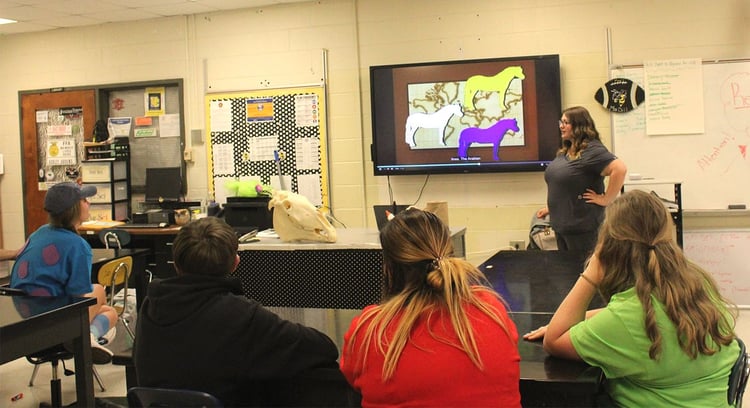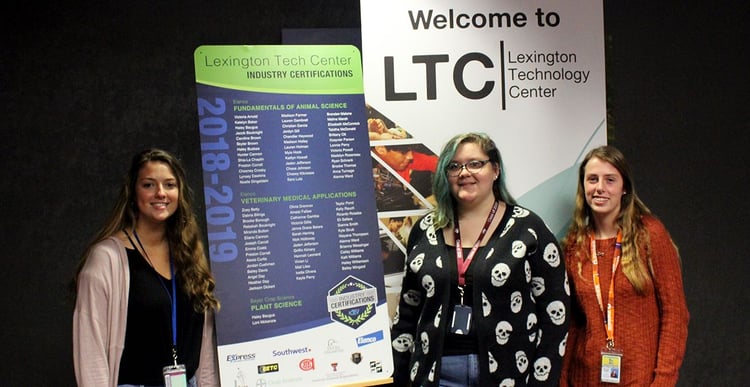CTE Curriculum
Prepare learners with CTE curriculum aligned to industry standards.
Case Study
Modernizing Career & Technical Education with Industry Certifications
In 1879, the first manual training school was founded at Washington University in St. Louis, Missouri. Established by Calvin M. Woodward, the institution featured courses in science, mathematics, language, literature, history, drawing and shop work. A proponent of connecting education to industry, Woodward attested his program prepared students for post-secondary education and the workforce. Woodward’s combination of classroom instruction and hands-on applications set the foundation for modern Career & Technical Education (CTE).
As American education and industry progressed, manual training was replaced with vocational education, known today as CTE. Now a recognized part of the U.S. educational system, CTE provides learners of all ages and experience levels opportunities to advance their knowledge and hone their technical skills to prepare for future academic and career pursuits. Since 1917, CTE has evolved to meet societal and workforce demands. Today, CTE includes 16 Career Clusters representing 79 career pathways, encompassing all aspects of the U.S. labor system.
Since the days of Woodward’s manual training school, CTE programs have become more prevalent. Across the nation, students and adults are preparing for their futures by participating in CTE. To increase access to CTE opportunities, some states have established centers focusing on CTE programs. South Carolina is home to more than 40 career and technology centers. These centers are spread across the state and appeal to a variety of interest areas and specialties. While each center offers valuable educational and training opportunities, two centers stand above the rest for the dedication to career preparedness.
Union County Career Center
Tucked in the rolling hills of rural upstate South Carolina, Union County is sustained by an expansive production and manufacturing industry. As the only career center in the county, the Union County Career Center serves the region’s youth and adults by preparing them to pursue jobs in Union County’s primary industries.
The Union County Career Center is technically separate from Union County High School; however, the two schools share the same campus. Of the approximately 1,100 students who attend the high school, nearly 900 students are dual-enrolled at the career center. The center offers a variety of programs, including cosmetology, sports medicine and auto collision repair. The agricultural science program boasts three pathways: animal science, environmental and natural resources and agricultural mechanics. Industry certifications are a central component of the career center’s agricultural science program.
Based on the need to validate technical knowledge and applicable skills, industry certifications are becoming a cornerstone of CTE programs across the nation. In South Carolina specifically, industry certifications have gained prominence in CTE programs across the state, particularly in agricultural science.

Ashley Dill leads a lecture about equine identification and selection.
South Carolina teachers bear their number of certified students as a badge of honor, and earning an industry certification has become a right of passage for many South Carolina agricultural science students.
Ashley Dill and Jeffery Whisenhunt, agricultural science teachers at the career center, completely restructured their course offerings to emphasize industry certifications. While some certifications, such as the Southwest Airlines Professional Communications Certification, are incorporated in all pathways, other certifications, like the National Horse Judging Team Coaches’ Association Equine Management & Evaluation Certification, are specific to a particular focus area. Theoretically, an agricultural science student at Union County Career Center could earn six industry certifications by the time they graduate high school.
The opportunity to earn so many certifications does not negate the intensive time and effort required to achieve an industry certification. Dill’s freshmen students spent the entire school year preparing for the Southwest Airlines Professional Communications Certification during their introduction to agricultural science course. Caroline Baron is one of Dill’s students who earned the Southwest Airlines Professional Communications Certification during her freshmen year. An active member of the Union County agricultural science program, Baron has aspirations of becoming a veterinarian and knows the knowledge she gained to prepare her for the certification will prepare her for her future career.
Regarding Dills’ introduction to agricultural science class, Baron said, “This class is probably one of the most influential towards my career because it teaches me about animals, but it also teaches me about leadership. It gives me a lot of great opportunities that can get me into college and can push me into the veterinary program.”
Another of Dill’s students, Levi Allen, is an active part of his family’s cattle and forestry operation. He says earning the Southwest Airlines Professional Communications Certification has strengthened his interactions with coworkers.
“Talking with my coworkers is a lot easier now,” said Allen. “I refer back to what I learned to prepare for the certification, and it helps me to get an idea of how to talk with them.”
Following Woodward’s example, Dill and Whisenhunt have crafted a unique course design by placing equal emphasis on traditional classroom instruction combined with experiential learning opportunities, such as earning an industry certification. By featuring industry certifications as the focal point of their agricultural program, Dill and Whisenhunt are upholding the mission of CTE by connecting education to industry.
Whisenhunt said it best when he stated, “I think you’re doing your students a disservice if you’re not trying to help them get an industry certification and better themselves.”
Lexington Technology Center
While the Union County Career Center caters to the rural residents of upstate South Carolina, the Lexington Technology Center serves the more urbanized population of the surrounding area. A bedroom community of Columbia, many of Lexington’s residents commute into the city for work, but the region still boasts a robust farming industry. The Lexington school district includes five high schools, all of which are incorporated within the technology center.
The technology center’s agricultural science program focuses on hands-on learning opportunities and the translation of technical skills to real-world scenarios. One of the technology center’s agricultural science teachers, Robert Bollier, places tremendous emphasis on industry certifications in his course designs. Bollier has seen the effect earning an industry certification can have on his students’ academic and career aspirations.
One of Bollier’s students was working at a local veterinary clinic when she earned the Elanco Veterinary Medical Applications Certification. After showing her employer the certification, the veterinarian told her the clinic would pay for her to move forward and achieve the state’s veterinary technician certification. In addition to verifying an earner’s technical knowledge, Bollier has seen how industry certifications impact his students’ employability skills.

Lexington students pose with their industry certification wall mount.
“If we can develop those critical thinking skills, those problem-solving skills, that’s what we need to do,” said Bollier, “That’s something our industry certifications can help with.”
During her time as a student in the technology center’s agricultural science program, Loni McKenzie earned the Elanco Fundamentals of Animal Science Certification, the Elanco Veterinary Medical Applications Certification and the BASF Plant Science Certification. As evidenced by the number of certifications she earned, McKenzie is a passionate and determined student. Now a student at Clemson University, McKenzie pursued these specific industry certifications to prepare for her future as an animal nutritionist. She aspires to work for a livestock feed distributor developing new nutrition products.
“I think these certifications have helped me in the long run,” said McKenzie. “I’ve found my passion for animal science through them.”
Caroline Brown is another of Bollier’s former students who earned industry certifications through the technology center’s agricultural science program. After earning the Elanco Fundamentals of Animal Science Certification and the Elanco Veterinary Medical Applications Certification, Brown had the opportunity to shadow the veterinarians and technicians at the Grace Animal Hospital. Because she had an extensive background in animal and veterinary science, Brown felt more engaged during the shadowing process and had a deeper understanding of the procedures and practices happening at the clinic.
“It gives me a little bit of an edge and more knowledge of the subject,” said Brown.
CTE has evolved since the early days at Woodward’s manual training school. Career and technology centers provide unique access to a wealth of professional development opportunities. The use of industry certifications in career and technology centers only strengthens the connections between education and industry. By following the example of Woodward’s manual training school, the Union County Career Center and the Lexington Technology Center are providing their students the knowledge and skills they need to embark on a variety of academic and career pursuits and achieve success in those fields.
About iCEV
Since 1984, iCEV has specialized in providing quality CTE curriculum and educational resources. iCEV is the most comprehensive online resource for CTE educators and students, offering curriculum for several major subject areas, including agricultural science, trade & industrial education, business & marketing, career exploration, family & consumer science, trade & health science, law enforcement and STEM education. iCEV also acts as a certification testing platform for industry certifications. Recognized companies and organizations utilize iCEV as the testing platform for their certifications. Additionally, iCEV offers Eduthings, a CTE data management platform that simplifies reporting for industry certifications, work-based learning, CTSO participation, and more. For more information, visit www.icevonline.com.




